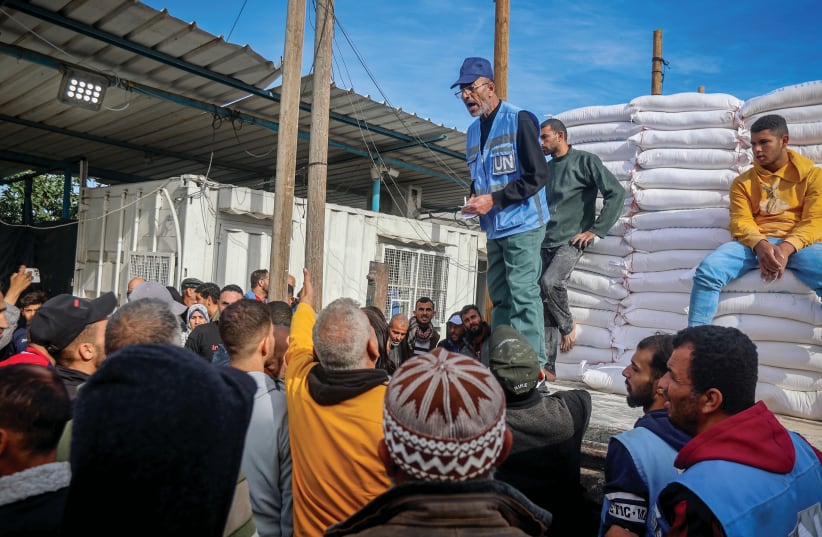May 11 marks 75 years since Israel became a full member of the United Nations in 1949. Today, as we view the United Nations’ inordinate hostility toward Israel, it is timely to recall a prime reason the UN came into being on October 24, 1945 – a matter of weeks following the end of World War II on September 2, 1945.
There can be little doubt that Hitler and his willing henchmen’s attempt to annihilate the Jewish people failed. Nevertheless, their success in murdering six million Jews – the most heinous of racially based atrocities – must have contributed toward the founding of the organization which, it was hoped, would prevent such barbaric happenings in the future. That organization was the UN, consisting of 51 founding member states.
Today, member states of the UN number 194, embracing 56 of the 57 members of the Organization of Islamic Cooperation (OIC). In addition, Bosnia and Herzegovina, the Central African Republic, Thailand, Russia, and Northern Cyprus (under the name of the Turkish Cypriot State) all have observer status within the OIC. Russia (a full member of the UN’s General Assembly and Security Council) has the largest Muslim population in Europe, numbering 14 million, or 10% of its population.
The current makeup of the UN does not bode well for Israel where, time and again, its General Assembly votes against the one Jewish state. Its inappropriately named Human Rights Council – consisting of countries elected by the General Assembly – chooses to ignore the blatant human rights abuses of far too many states (some of which sit on this body) yet retain a sole item on its regular agenda specifically to bash Israel.
The current conflict in Gaza has revealed – what many hitherto had believed to be the case – that UNRWA (the United Nations Relief and Works Agency for Palestinian Refugees) has actively supported Hamas, allowing its premises to be used for the storage and firing of weapons, as well as a sanctuary for Hamas terrorists. In addition, there can be no doubt about the fundamental lack of neutrality among UNRWA employees – a key finding of the Independent Review Group headed by former French foreign minister Catherine Colonna.
Further, as pointed out in a Jerusalem Post article by Michal Hatuel-Radoshitzky, the lack of neutrality of those employed by UNRWA to work in Gaza is hardly surprising when of the 32,000 UNRWA staff, 0.8% are international, and 99.2% are locals. The report says that there are 50 neutrality cases under investigation. To date, a mere six investigator posts have been allocated, with two of these positions vacant; three are limited-duration contract positions based on project funding.
With the above revelations, it should not be difficult to understand why the UN has failed to name Hamas and Islamic Jihad (as well as the Islamic Revolutionary Guard Corps) as terrorist organizations.
THIS PAST week, we commemorated Holocaust Remembrance Day. The world today is witnessing an unprecedented rise in antisemitism that can only be compared to the 1930s – the period of the rise of fascism and the ascent of Hitler. We fear for what the future holds, especially for our children and grandchildren, as we witness university campuses globally rife with thousands participating in pro-Hamas gatherings, where virulent, uninhibited antisemitism is voiced.
Having recently returned from the UK and witnessed the increase in security required at Jewish establishments – the result of today’s antisemitism – questions arise as to Diaspora Jewry’s tomorrow. To what extent will governments (not only in the UK but worldwide) confront the increased volatile antisemitism, specifically when elections are imminent?
The Brits will be voting in the coming months for a new government. The polls predict a Labour Party win by an overwhelming majority. Labour’s former leader, Jeremy Corbyn – a glaring antisemite – took himself to the International Court in The Hague to support South Africa’s defamatory claim that Israel carried out genocidal acts against the civilian population of Gaza.
Labour’s current leader, Keir Starmer, does not have the full support of his colleagues. Following the election, the Corbynites could come out of the woodwork and take the reins of the party. If this were the case, then a situation might arise where Britain emulates the Germany of the 1930s, with antisemitism becoming state-sanctioned antisemitism.
And what of those of us who live in Israel? We are engaged in a war like no other since Israel’s rebirth in 1948: a war raging on the country’s southern and northern borders, necessitating the evacuation of thousands of citizens, with some 90,000 from the North unable to return to their homes in the foreseeable future.
We suffered the most horrific and bestial attack on our men, women, and children on Oct. 7, which too many states at the UN have chosen to forget. Israel cannot afford to lose this war – not only because of its responsibility to its citizens but also because Diaspora Jewry takes comfort in the existence of the one state whose gates remain ever open.
Back to the beginning. While the UN came into being in the aftermath of the Holocaust, currently it is a contributing factor to Jew-hatred. The time is ripe for a new international body that recognizes the difference between right and wrong.
The writer is chairperson of Israel, Britain, and the Commonwealth Association.

